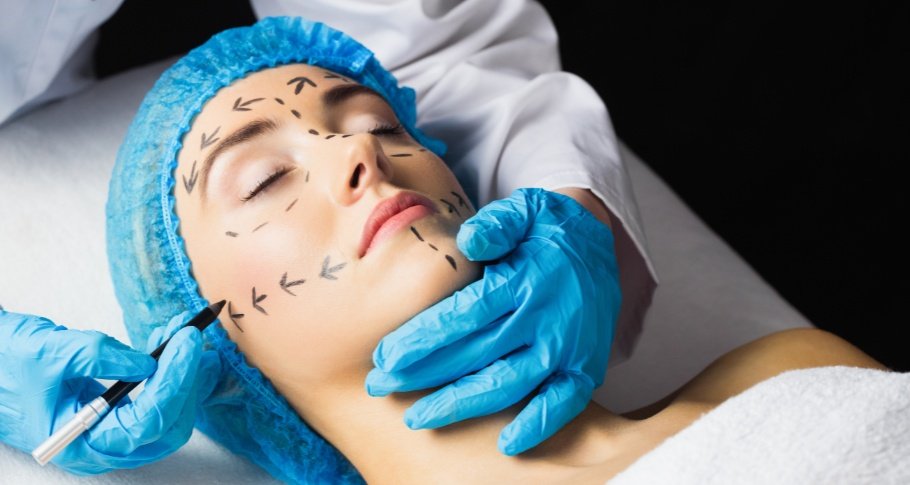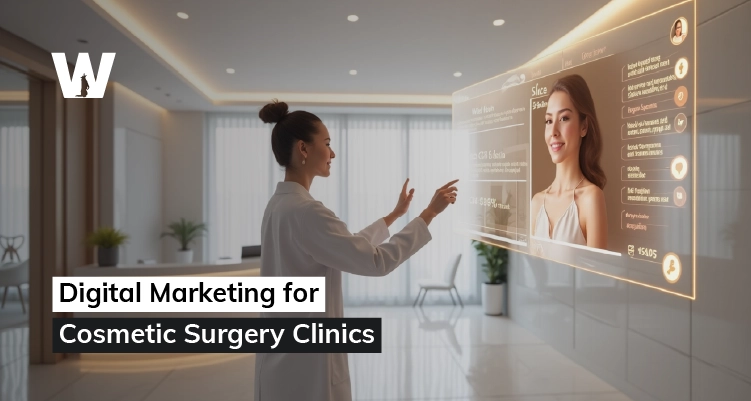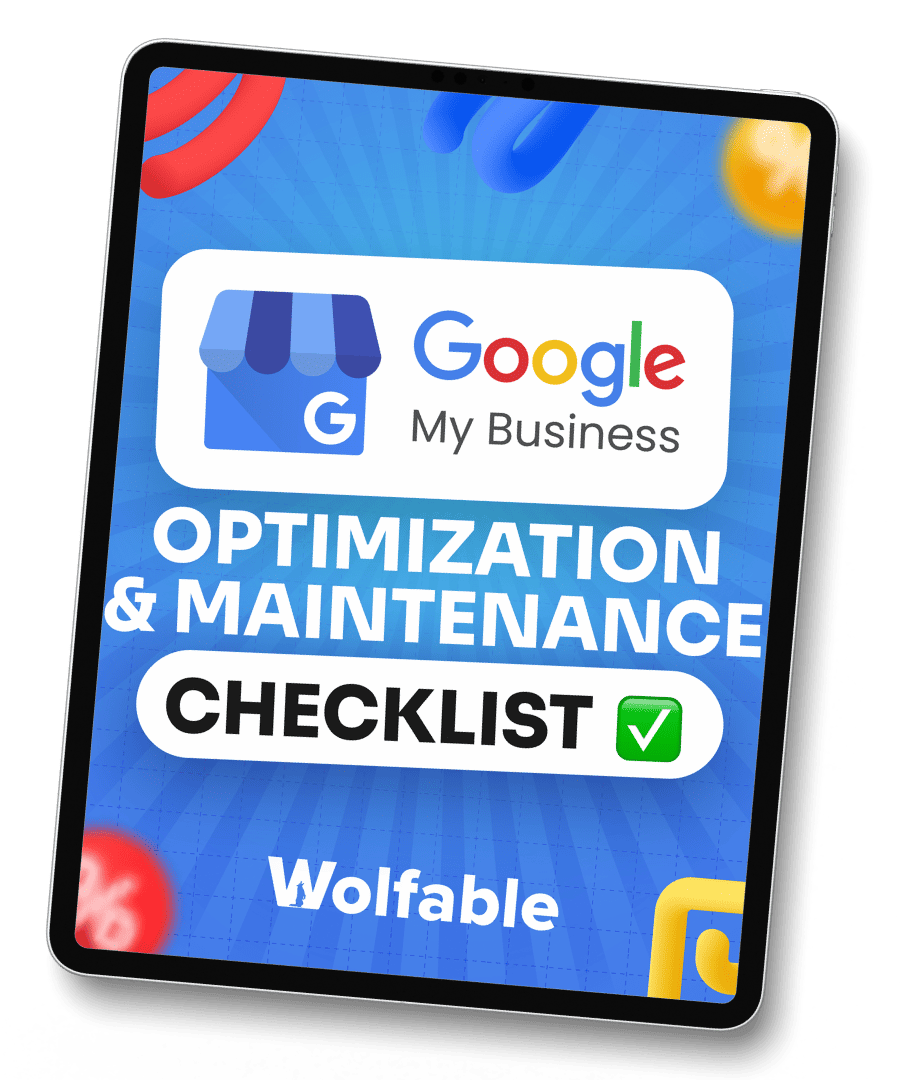Wraps up in 8 Minutes
In today's image-conscious world, cosmetic surgery clinics face unique marketing challenges and opportunities. How do you showcase your expertise while maintaining patient privacy? How can you stand out in a competitive market where trust is everything?
At Wolfable, we understand the delicate balance between promoting aesthetic services and maintaining medical professionalism. Our approach combines strategic marketing with healthcare expertise to help cosmetic surgery clinics succeed in the digital space.
This comprehensive guide explores how cosmetic surgery clinics can leverage digital marketing to attract more patients, build trust, and grow their practice while navigating the unique challenges of aesthetic medicine marketing.
Understanding Today's Cosmetic Surgery Patient Journey
How do patients find cosmetic surgeons?
The modern patient journey begins online for 85% of cosmetic procedure seekers. Before scheduling a consultation, most potential patients will:
- Search for specific procedures or treatments
- Read reviews and testimonials
- View before-and-after galleries
- Research surgeon credentials and experience
- Compare pricing and financing options
- Engage with content on social media platforms
This digital-first approach means your online presence directly impacts your patient acquisition success. Your website, search visibility, social proof, and content marketing strategy all play crucial roles in attracting qualified leads.
| Patient Journey Stage | Digital Touchpoints | Marketing Opportunities |
|---|---|---|
| Awareness | Google searches, social media, display ads | SEO, paid search, social media content |
| Consideration | Website, before/after galleries, reviews | Content marketing, email nurturing, retargeting |
| Decision | Consultation booking, financing info | Conversion optimization, chatbots, special offers |
| Post-Procedure | Follow-up emails, social engagement | Testimonial collection, referral programs |
Understanding this journey allows you to create targeted marketing strategies that meet potential patients at each stage with relevant, helpful information.

Essential Digital Marketing Channels for Cosmetic Surgery Clinics
1. Your Website: The Digital Front Door to Your Practice
"What makes a good cosmetic surgery website?"
Your website is often the first impression potential patients have of your practice. It should reflect your expertise, aesthetic sensibility, and commitment to patient care.
Important elements of an effective cosmetic surgery website include:
- Clean, modern design that conveys professionalism and luxury
- Mobile responsiveness for on-the-go browsing
- Fast loading speeds (patients will leave if pages take more than 3 seconds to load)
- High-quality imagery, including before-and-after galleries
- Clear information about procedures, recovery, and results
- Prominent calls-to-action for consultations
- Surgeon credentials and practice information
- Patient testimonials and success stories
Remember that patient privacy is paramount. Always obtain proper consent for any patient images or testimonials you display.
Conversion Optimization Tips:
- Place consultation booking forms prominently on every page
- Include multiple contact options (phone, form, chat)
- Offer virtual consultation scheduling
- Feature financing information to address cost concerns
- Implement live chat to answer immediate questions
2. Search Engine Optimization: Being Found When Patients Search
"How can my cosmetic surgery clinic rank higher on Google?"
When potential patients search for cosmetic procedures, your practice needs to appear in those search results. SEO for cosmetic surgery requires a specialized approach.
Local SEO Strategies:
- Optimize your Google Business Profile with accurate information
- Collect and respond to Google reviews
- Create location-specific pages for multi-location practices
- Build citations on medical directories and local business sites
- Develop content addressing local search terms (e.g., "best rhinoplasty surgeon in [city]")
- Create comprehensive pages for each procedure you offer
- Address common questions patients have about specific treatments
- Include relevant medical terminology and layman's terms
- Incorporate before-and-after images with optimized alt text
- Add schema markup for medical procedures
- Develop FAQ content that matches search intent
- Maintain a regularly updated blog covering procedure information
- Create educational content about recovery, results, and innovations
- Develop comparison content (e.g., "Surgical vs. Non-surgical Facelift")
- Produce content addressing procedure costs and financing
- Share patient stories (with permission) to showcase results
3. Pay-Per-Click Advertising: Targeted Visibility for High-Intent Searches
"Which paid ads work best for cosmetic surgery clinics?"
While organic visibility is valuable, PPC advertising allows immediate visibility for high-intent searches. Cosmetic surgery has high customer lifetime value, making PPC investment worthwhile despite competitive cost-per-click rates.
Effective PPC strategies include:
- Bidding on procedure-specific keywords with high intent
- Creating dedicated landing pages for each ad campaign
- Highlighting unique selling points and surgeon credentials
- Including strong visual elements in ads
- Offering consultation specials or evaluations
- Implementing remarketing to stay visible to previous website visitors
- Using ad extensions to improve click-through rates
- Focus on specific procedures rather than general terms
- Include pricing information, when possible, to pre-qualify leads
- Highlight board certifications and experience
- Test different ad formats (text, responsive, image)
- Use location targeting to reach your service area
- Implement conversion tracking to measure ROI
4. Social Media Marketing: Building Relationships and Showcasing Results
"Which social platforms are best for cosmetic surgery marketing?"
Social media platforms provide unique opportunities to showcase your work, educate patients, and build community. Each platform serves different purposes in your marketing strategy:
Instagram:
- Visual platform ideal for before-and-after photos
- Stories feature for behind-the-scenes content
- IGTV for procedure explanations and Q&As
- Influencer partnerships with previous patients
Facebook:
- Community building and patient engagement
- Targeted advertising with detailed demographics
- Reviews and testimonials
- Private groups for specific procedures or recovery support
YouTube:
- Detailed procedure videos and explanations
- Patient testimonial videos
- Recovery journey documentation
- Live Q&A sessions with surgeons
TikTok:
- Short educational content about procedures
- Quick tips for recovery or treatment options
- Trending audio to reach younger demographics
- Day-in-the-life content humanizing your practice
Pinterest:
- Before-and-after inspiration boards
- Procedure information infographics
- Recovery tips and preparation guidance
- Long-term visibility through saved pins
LinkedIn:
- Professional networking with referral sources
- Thought leadership content from surgeons
- Practice news and achievements
- Industry insights and innovations
Remember that all social media content must comply with healthcare regulations regarding patient privacy and medical advertising.
5. Email Marketing: Nurturing Relationships Before and After Procedures
"How should cosmetic surgery clinics use email marketing?"
Email marketing remains one of the most effective channels for converting interested prospects into consultations and maintaining relationships with previous patients.
Effective email marketing strategies include:
- Consultation follow-up sequences
- Procedure information series
- Recovery guidance emails
- Special offers on complementary procedures
- Practice newsletters with educational content
- Post-procedure check-in and care instructions
- Seasonal promotions for popular procedures
Email Marketing Tips:
- Segment your list based on procedures of interest
- Personalize content based on patient journey stage
- Include visual elements that showcase results
- Maintain HIPAA compliance in all communications
- Test subject lines for optimal open rates
- Schedule sends at optimal times for your audience
- Include clear calls-to-action for next steps
6. Content Marketing: Educating and Engaging Potential Patients
"What content should cosmetic surgery clinics create?"
Content marketing serves multiple purposes for cosmetic surgery clinics: educating patients, demonstrating expertise, improving SEO, and addressing common concerns.
Effective content types include:
- Procedure guides explaining options, recovery, and results
- Recovery journals documenting the healing process
- Comparison content between similar procedures
- Cost and financing information
- Myth-busting articles addressing common misconceptions
- Surgeon spotlights highlighting expertise and approaches
- Patient stories showcasing transformations and experiences
Content Marketing Best Practices:
- Focus on addressing patient questions and concerns
- Use medical illustrations to explain procedures
- Balance medical accuracy with accessible language
- Include natural language questions patients might ask
- Update content regularly to reflect new techniques
- Incorporate video where appropriate to improve engagement
7. Video Marketing: Bringing Procedures and Results to Life
"How can cosmetic surgeons use video marketing effectively?"
Video content has become essential for cosmetic surgery marketing, as it builds trust, showcases results, and explains complex procedures in accessible ways.
Effective video content includes:
- Procedure explanations and animations
- Surgeon Q&A sessions
- Patient testimonials and journey documentation
- Virtual consultations and assessment guides
- Recovery timeline videos
- Practice tours and team introductions
- Behind-the-scenes glimpses of your approach
Video Marketing Tips:
- Keep videos concise and focused on one topic
- Include captions for accessibility and silent viewing
- Ensure high production quality that reflects your practice standards
- Host videos on your website and YouTube for maximum visibility
- Create video snippets for social media platforms
- Include clear calls-to-action at the end of each video
- Maintain patient privacy and obtain proper consent
Digital Marketing Solutions for
Cosmetic Surgery Clinics
Ready to transform your online presence?
Advanced Digital Marketing Strategies for Cosmetic Surgery Clinics
1. Virtual Consultations: Expanding Your Patient Reach
Virtual consultations have transformed the patient acquisition process, allowing you to connect with patients regardless of geographic location. This technology:
- Removes barriers for out-of-town patients
- Saves time for both patients and practitioners
- Pre-qualifies patients before in-person visits
- Increases conversion rates through personal connection
- Expands your potential patient pool beyond local markets
Implementing an effective virtual consultation program requires:
- HIPAA-compliant video platform
- Standardized assessment protocols
- Digital intake forms
- Screen sharing capabilities for education
- Follow-up processes to convert to in-person consultations
2. AI-Powered Engagement Tools
Artificial intelligence is transforming patient engagement for cosmetic surgery practices through:
- Virtual try-on technology for facial procedures
- Chatbots for 24/7 patient questions and consultation scheduling
- Personalized treatment recommendation engines
- Automated follow-up systems
- Predictive analytics for marketing optimization
These tools enhance the patient's experience while streamlining operations and improving conversion rates.
3. Reputation Management: Building and Maintaining Digital Trust
"How can I improve my cosmetic surgery clinic's online reviews?"
For cosmetic surgery practices, online reputation directly impacts patient acquisition. Proactive reputation management includes:
- Systematic review collection from satisfied patients
- Monitoring of review platforms (Google, RealSelf, Yelp, Healthgrades)
- Swift, professional responses to all reviews
- HIPAA-compliant response strategies for negative reviews
- Showcase of positive reviews across marketing channels
- Reputation recovery strategies when needed
Remember that authenticity is crucial—never create fake reviews or offer incentives for positive feedback, as this violates platform policies and medical ethics guidelines.
4. Influencer Marketing: Authentic Procedure Showcases
"How should cosmetic surgery clinics work with influencers?"
Influencer partnerships can powerfully showcase results, but require careful navigation of healthcare regulations:
- Partner with previous patients who genuinely love their results
- Work with micro-influencers in your geographic area
- Ensure all sponsored content is clearly disclosed
- Provide medical supervision for all content creation
- Focus on education rather than promotion
- Maintain patient confidentiality at all times
- Avoid unrealistic expectations or guarantees
The most effective partnerships often come from existing patients with authentic transformation stories.

Addressing Marketing Challenges Unique to Cosmetic Surgery
1. Navigating Healthcare Regulations in Marketing
"How can cosmetic surgery clinics market effectively while staying compliant?"
Cosmetic surgery marketing must navigate complex regulatory requirements from multiple authorities:
- FTC regulations regarding before-and-after photos
- State medical board advertising guidelines
- HIPAA requirements for patient privacy
- FDA restrictions on procedure claims
- Social media platform policies for medical content
Best practices for compliant marketing include:
- Legal review of marketing materials and claims
- Clear disclosure of risks and realistic expectations
- Proper patient consent for testimonials and images
- Accurate representation of surgeon credentials
- Documentation of all marketing materials and approvals
- Regular audits of marketing compliance
2. Balancing Medical Authority with Aesthetic Appeal
"How should cosmetic surgeons present themselves online?"
Cosmetic surgery marketing requires a delicate balance between:
- Medical professionalism and expertise
- Approachability and empathy
- Luxury and exclusivity
- Transparency and ethics
Your digital presence should convey surgical expertise while making patients feel comfortable and confident in their decisions.
Successful positioning strategies include:
- Highlighting board certifications and specialized training
- Sharing the surgeon's philosophy and approach
- Demonstrating commitment to natural-looking results
- Emphasizing patient safety and ethical practices
- Showcasing the patient experience from consultation to recovery
3. Managing Price Sensitivity and Value Communication
"How should cosmetic surgery clinics address procedure costs online?"
Price sensitivity is a significant factor in cosmetic procedure decisions. Effective strategies for addressing this include:
- Transparent discussion of price factors
- Education about investment value versus temporary solutions
- Financing option information
- Package pricing for complementary procedures
- Membership programs for ongoing treatments
- Clear communication about the relationship between quality and cost
Avoid positioning solely on price, as this attracts price-shopping patients rather than those who value quality and results.
Measuring Success: Analytics and KPIs for Cosmetic Surgery Marketing
"How do I know if my cosmetic surgery marketing is working?"
Measuring the effectiveness of your digital marketing efforts requires tracking specific metrics that align with business objectives.
1. Key Performance Indicators to Track:
- Consultation requests (online and phone)
- Consultation-to-procedure conversion rate
- Cost per consultation acquisition
- Procedure revenue by marketing channel
- Website engagement metrics
- Before/after gallery views
- Specific procedure page traffic
- Virtual consultation bookings
- Email open and click-through rates
- Social media engagement and growth
- Review volume and average rating
2. Analytics Tools for Cosmetic Surgery Practices:
- Google Analytics 4 for website performance
- Call tracking software to attribute phone leads
- CRM integration for patient journey tracking
- Heat mapping tools to optimize website user experience
- Social media analytics platforms
- Email marketing performance dashboards
- Competitive analysis tools
Remember that data should drive decision-making—regularly review performance metrics and adjust strategies accordingly.
Creating Your Cosmetic Surgery Digital Marketing Strategy
"How do I create an effective digital marketing plan for my practice?"
Developing a comprehensive marketing strategy for your cosmetic surgery practice involves several key steps:
1. Audit Your Current Digital Presence
Begin by assessing your existing digital footprint:
- Website performance and user experience
- Search visibility for key procedures
- Social media presence and engagement
- Online reputation and review sentiment
- Competitor positioning and strategies
- Current patient acquisition channels
This baseline assessment identifies strengths to leverage and opportunities for improvement.
2. Define Your Unique Value Proposition
What truly sets your practice apart?
- Specialized techniques or technologies
- Surgeon experience and credentials
- Patient experience and amenities
- Recovery protocols and support
- Natural-looking results philosophy
- Geographic advantages or specialization
Your UVP should be authentic, defensible, and meaningful to patients.
3. Identify Your Ideal Patient Profiles
Different procedures attract different patient demographics. Develop detailed profiles for your ideal patients by:
- Age, gender, and income demographics
- Geographic location
- Lifestyle factors and motivations
- Procedure interests and budget considerations
- Digital behavior and research habits
These profiles guide targeting and messaging strategies across channels.
4. Set Specific, Measurable Goals
Establish clear objectives for your marketing efforts:
- Consultation volume targets by procedure
- Revenue growth projections
- New patient acquisition costs
- Geographic expansion milestones
- Specific procedure growth objectives
- Digital presence metrics (followers, engagement, etc.)
These goals provide benchmarks to measure success and ROI.
5. Develop Your Channel Strategy
Based on your audit, UVP, patient profiles, and goals, determine which channels will most effectively reach your target audience:
- Website optimization priorities
- SEO focus areas
- Paid advertising platforms and budget allocation
- Social media platform prioritization
- Content marketing themes and formats
- Email marketing objectives
- Video content strategy
Allocate resources based on potential impact and alignment with practice goals.
6. Create an Implementation Timeline
Develop a phased approach to execution that considers:
- Quick wins for immediate results
- Foundation-building for long-term success
- Seasonal procedure demand fluctuations
- Resource availability and budget considerations
- Technology implementation requirements
A structured timeline prevents overwhelm and ensures steady progress.
7. Establish Measurement Systems
Implement analytics and tracking to monitor performance:
- Google Analytics 4 configuration
- Call tracking implementation
- Consultation source tracking
- ROI measurement protocols
- Regular reporting cadence
- Performance review meetings
These systems provide the data needed to optimize strategies over time.
Staying Ahead: Emerging Trends in Cosmetic Surgery Marketing
"What's next in digital marketing for cosmetic surgery?"
The cosmetic surgery marketing landscape continues to evolve. Stay ahead by monitoring these emerging trends:
1. AI-Enhanced Patient Experiences
Artificial intelligence is transforming patient interactions through:
- Virtual procedure simulations
- Personalized treatment recommendations
- Automated follow-up and recovery support
- Predictive analytics for procedure planning
- Natural language processing for patient communications
These technologies enhance the patient's experience while streamlining practice operations.
2. Video-First Social Strategies
Short-form video content continues to dominate social platforms, creating opportunities through:
- Procedure explainer videos
- Surgeon personality showcases
- Patient journey documentation
- Behind-the-scenes practice glimpses
- Live Q&A sessions
Practices that embrace video storytelling connect more authentically with potential patients.
3. Voice Search Optimization
As voice-activated devices become ubiquitous, optimizing for voice search queries becomes essential:
- Natural language question optimization
- Local voice search strategies
- FAQ content structured for voice responses
- Voice-friendly website navigation
- Conversational content development
Voice optimization ensures visibility as search behavior evolves.
4. Privacy-First Marketing
With increasing privacy regulations and changing consumer expectations, ethical data practices are becoming a competitive advantage:
- First-party data collection strategies
- HIPAA-compliant marketing automations
- Transparent cookie and tracking policies
- Privacy-respecting advertising approaches
- Contextual targeting alternatives
Practices that respect patient privacy build greater trust and loyalty.

Why Choose Wolfable for Your Cosmetic Surgery Digital Marketing
At Wolfable, we bring specialized expertise to cosmetic surgery marketing through our deep understanding of both digital marketing strategy and the unique challenges of aesthetic medicine.
Our Approach to Cosmetic Surgery Marketing:
We blend creativity and performance to build iconic cosmetic surgery brands. Since 2016, we've helped aesthetic practices transform strategic decisions into promises that resonate with patients.
Every time a potential patient touches your brand is an opportunity to deliver a wow moment. We help you craft these moments through:
- Strategic brand development that positions your unique expertise
- Creative content that educates and inspires
- Performance marketing that delivers measurable results
- Website experiences that convert visitors into consultations
- Social media presence that builds community and trust
- Video content that brings procedures and results to life
Our dedicated team of skilled marketers, talented designers, expert content writers, prompt engineers, web developers, strategists, and video creators work collaboratively to deliver innovative, customized solutions tailored to the unique needs of your cosmetic surgery practice.
The Wolfable Difference:
At the heart of Wolfable, three truths guide our work with cosmetic surgery clients:
Helping others succeed: Your practice growth is our primary objective
Inspiring through our work: Creating marketing that elevates your brand
Letting data and results speak: Measurable outcomes drive our strategies
These principles ensure we deliver on our commitments and produce real results for your practice.
Conclusion: Your Digital Marketing Roadmap for Cosmetic Surgery Success
Digital marketing for cosmetic surgery clinics requires specialized expertise, ethical considerations, and strategic implementation. By developing a comprehensive approach that addresses the unique challenges of aesthetic medicine marketing, your practice can attract more qualified patients, showcase your expertise, and grow your reputation.
The most successful cosmetic surgery practices recognize that digital marketing is not just about promotion—it's about patient education, trust-building, and creating meaningful connections that lead to transformative surgical experiences.
At Wolfable, we partner with cosmetic surgery practices to develop and implement digital marketing strategies that deliver measurable results while maintaining the highest standards of medical professionalism and ethics.
Ready to elevate your cosmetic surgery practice's digital presence? Contact us to discuss how we can help you achieve your growth objectives through strategic digital marketing.
Healthcare Marketing Agency in London, UK
Wolfable is a full-service healthcare marketing agency in London, UK dedicated to helping hospitals, doctors, and wellness clinics grow their presence and attract more patients. We offer comprehensive services, including auditing strategies and marketing for Cosmetic Surgery Clinics. Our expertise spans new patient acquisition programmes, search engine marketing, web development, e-commerce solutions, social media marketing, and YouTube marketing. With a deep understanding of the healthcare sector, our strategies are tailored to meet your specific needs, ensuring compliance and delivering measurable results. Whether you aim to enhance your online reputation or expand your practice, Wolfable is here to help you succeed, connect with us today!









